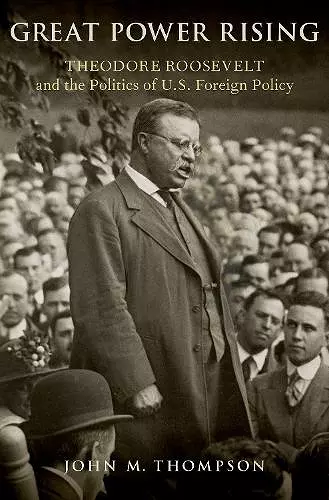Great Power Rising
Theodore Roosevelt and the Politics of U.S. Foreign Policy
Format:Hardback
Publisher:Oxford University Press Inc
Published:21st Feb '19
Currently unavailable, currently targeted to be due back around 1st February 2025, but could change

The nature of the US political system, with its overlapping powers, intense partisanship, and continuous scrutiny from the media and public, complicates the conduct of foreign policy. While numerous presidents have struggled under the weight of these conditions, Theodore Roosevelt thrived and is widely lauded for his diplomacy. Roosevelt played a crucial role in the nation's rise to world power, competition with other new Great Powers such as Germany and Japan, and US participation in World War I. He was able to implement the majority of his agenda even though he was confronted by a hostile Democratic Party, suspicious conservatives in the Republican Party, and the social and political ferment of the progressive era. The president, John M. Thompson argues, combined a compelling vision for national greatness, considerable political skill, faith in the people and the US system, and an emphasis on providing leadership. It helped that the public mood was not isolationist, but was willing to support all of his major objectives-though Roosevelt's feel for the national mood was crucial, as was his willingness to compromise when necessary. This book traces the reactions of Americans to the chief foreign policy events of the era and the ways in which Roosevelt responded to and sought to shape his political environment. Offering the first analysis of the politics of foreign policy for the entirety of Roosevelt's career, Great Power Rising sheds new light on the twenty-sixth president and the nation's emergence as a preeminent player in international affairs.
A thoughtful, deeply researched book....[that] contends that TR believed in the intelligence of the 'plain people' and was convinced that the American people, if properly led, would support an ambitious foreign policy agenda. * Charles E. Neu, Journal of American History *
Some credit for the United States starting on its path to greatness must go to President Theodore Roosevelt, although this is not only for his skills as a statesman in competing or collaborating with foreign statesmen but more, according to Thompson, for his mastery of domestic politics in building popular support for, and mitigating domestic opposition to, his foreign policies....Great Power Rising is a retelling of that familiar story from the inside out. Thompson shows with impressive diligence that Roosevelt was as deft, bold, and consequential a statesman behind the scenes...as he was in the spotlight. * Kenneth Weisbrode, Diplomacy & Statecraft *
This excellent study on TR's political finesse and his efforts to shape U.S. foreign policy is scholarly, appealing to a wide audience, and a significant contribution to the historiography of Theodore Roosevelt. * Theodore Roosevelt Association Book Prize *
Though Thompson does not provide a final answer to this question, his detailed analysis of Roosevelt's political strategy moves us closer to one. * Benjamin Coates, H-Net *
An insightful, well-researched interpretation of early 20th century American policymaking and Theodore Roosevelt's influence on it...Great Power Rising makes a meaningful contribution because of its nuanced view of the ties between the American democratic environment and US foreign policy. * Stanley Schwartz, Strategic Visions *
This is the most comprehensive and insightful treatment yet done of Theodore Roosevelt's approach and actions in foreign policy. To Thompson's great credit, he examines where TR stood after he left the White House and brings back the intellectual and policy dimensions of his quarrel with Woodrow Wilson. * John Milton Cooper, Jr., author of Woodrow Wilson: A Biography *
John Thompson cogently places Theodore Roosevelt's foreign policy into its domestic context, revealing in the process the importance of public opinion, mass communications, and party politics to the rise of the United States. Clearly argued and brimming with colorful detail, this book recasts not only TR's statecraft, but also the enduring interplay between international affairs and domestic politics. * Jay Sexton, author ofA Nation Forged by Crisis: A New American History *
The great merit of John M. Thompson's study, backed by an impressive array of primary sources, is to shed new light on the domestic context - particularly public opinion - and to reveal to what extent it was a major determinant of TR's foreign policy. As such this novel approach to TR's diplomacy usefully and neatly completes previous works similarly devoted to his unique statecraft in international affairs. * Serge Ricard, editor of A Companion to Theodore Roosevelt *
Theodore Roosevelt was the first president to embrace the idea of the United States as a world power. Great Power Rising thoughtfully examines how domestic politics shaped and constrained his efforts to pursue more activist policies abroad. In doing so, it highlights a lesson that still holds true for presidents today-successful statesmanship requires understanding and navigating the currents of public opinion. * James M. Lindsay, Council on Foreign Relations *
- Winner of Winner of the Theodore Roosevelt Association Book Prize.
ISBN: 9780190859954
Dimensions: 165mm x 239mm x 28mm
Weight: 567g
288 pages